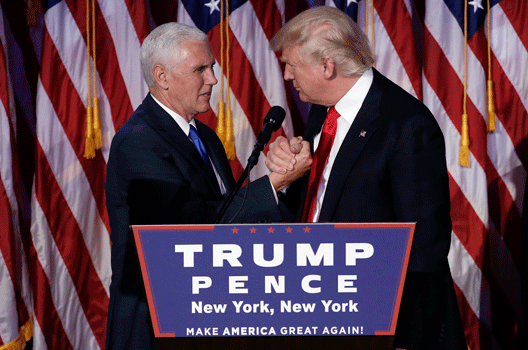 President-elect Donald J. Trump has delivered the greatest upset to Western politics in memory. This is Brexit on a global scale. Bye bye liberal order; welcome new post-liberal world!
President-elect Donald J. Trump has delivered the greatest upset to Western politics in memory. This is Brexit on a global scale. Bye bye liberal order; welcome new post-liberal world!
Trump’s victory could not be more resounding. Not only did he win the election, coming from the position of the odd outsider, but he won a comfortable majority in the electoral college. Additionally, the Republicans have consolidated their hold on Congress. However, like Obama eight years ago, though this time with differing intentions, Trump is heading for the White House with extremely high expectations and many promises he will most likely fail to deliver. The question is how much damage will be done along the way. The disappointment may be as brutal as his win was surprising.
However, a Trump presidency will have more levers of power than many of his predecessors, as indicated by a majority in both chambers of Congress as well as the Supreme Court. A reluctant and in some cases renegade Republican party will have to accept the terms of Trump’s victory. We can expect Republicans, even the most skeptical, to rally around the president on domestic issues, especially focusing on lower taxes and the repeal of Obamacare, though immigration might be more divisive an issue. However, the greatest source of division is more likely to center on foreign policy. This is where most, if not all, members of the Republican establishment opposed Trump. We can expect Republicans in Congress to attempt to mitigate Trump’s isolationist instincts and potentially resist his proposed foreign policy agenda. After all, Congress holds the string of the US foreign and defense policy purse and retains the right to vote on sanctions, such as those on Iran.
All in all we are set for more volatility and unpredictability in the US global posture. Many of the liberal order’s building blocks are going to be shaken, such as free trade and US alliances in Europe and Asia. That which constitutes decades of nuclear stability could well be turned upside down, if Trump is taken at his own words.
Putin emerges as the other winner of this election. He will certainly wait for Trump to make the first move and confirm his willingness to strike a new entente with Russia. Similar to the way Putin presumably views an open dialogue with the United States, a US relationship with Russia could well be for Trump a matter of solidifying his status as a world leader. Though popularly elected, Trump lacks presidential stature, yet great power negotiations can help change this image. If a new US-Russia deal could help solve the intractable Syria conflict without having to commit more US troops, then all the better for President Trump. However, engagement with Russia in itself will be a success.
The traditional friends and partners of the United States will watch with anxiety. We could well see the acceleration of the fragmentation of the West. Traditional US-led alliances like NATO will lose a bit more of their relevance simply due to the caveat a Trump administration will put on the US commitment. Trump has called for all NATO members to meet the 2 percent commitment, and claimed that other countries are not paying their share. This is in turn will trigger a greater nationalization and regionalization of security. The more vulnerable or exposed countries – the so-called front line states in Europe and Asia – will have to fight harder for support and security. The uncertainty engendered by a Trump administration has made their position more precarious, starting with Ukraine.
This will put an extra burden on European allies, especially Germany, to try to counter-balance and absorb the shock of Trump’s foreign policy. However, given the weak political positions of the parties currently in power throughout Europe there is not much more we can expect from them at the moment.
This is a bleak scenario. There might be more compromises and realism from a Trump administration, but the supporters of the liberal order in the United States, Europe, and Asia need to take a deep breath and adjust to the future they now face. The argument that Trump will somehow soften and aim to govern from the middle ground should be regarded with as much skepticism as voting intention polls. The fact is that just by his election, Trump has already created a new political reality. The liberal establishment is now becoming the outsider, and its members will need to adopt a strategy of resistance and damage limitation to save the fundamentals of the liberal order such as trade and security alliances. Additionally, they will need a strategy of political re-conquest to regain the electoral middle ground which has shifted to the fringes. Without this renewal of support, supporters of a liberal world order will fail to regain power and end up sidelined, watching the slow unravelling of the world as we know it.
Fabrice Pothier is a nonresident research fellow at the Atlantic Council.
Image: Donald Trump greets his running mate Mike Pence during his election night rally in Manhattan. (Reuters/Mike Segar)
